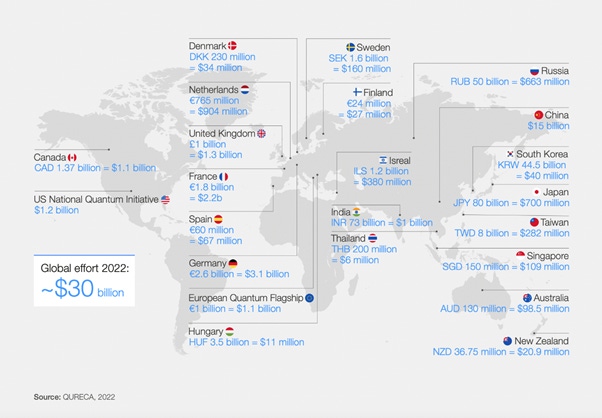
Connects decision-makers and solutions creators to what's next in quantum computing
World Economic Forum Warns of ‘Quantum Divide’
Quantum leaders encouraged to commit to inclusivity in quantum education

The World Economic Forum (WEF) has warned that many countries risk being left behind in the quantum technology race and has called for quantum leaders to close the divide.
Quantum technology is widely recognized as having a far-reaching impact on industry and governments in the near future. However, only 17 countries have invested in a national program of quantum technology research and development while more than 150 have not. Another three countries have strategies under development and 12 have significant government-funded or -endorsed initiatives.
According to the WEF, quantum forms part of the Fourth Industrial Revolution, alongside technology such as AI, IoT and robotics. It identifies cybersecurity, simulation and optimization, and quantum sensing as three key areas in which countries that invest in quantum technology can benefit.
The planned global public spend in 2022 on developing quantum technology was estimated to exceed $30 billion, with China alone accounting for roughly half of that total and the European Union making up almost another quarter. The remaining quarter is distributed mostly between nine countries, led by the U.S., Canada, Japan and the U.K.
The WEF says that to avoid a quantum divide developing further, countries with more developed quantum programs must make a commitment to inclusivity in quantum education. It highlights the U.K.’s National Quantum Technologies Program and Canada’s Institute for Quantum Computing as national efforts aimed at staying ahead of the quantum curve. Israel and Singapore are also making significant investments despite being relatively small countries.
However, the WEF warns that before countries can realize the potential benefits of quantum computing, they must first prioritize addressing the quantum threat to cybersecurity to protect economic interests, critical infrastructure and national security.
The WEF has launched its National Quantum Blueprint initiative to provide a road map for national governments and regional economic associations to build a quantum ecosystem and drive positive outcomes for society.
About the Author(s)
You May Also Like
.png?width=100&auto=webp&quality=80&disable=upscale)
.png?width=400&auto=webp&quality=80&disable=upscale)




